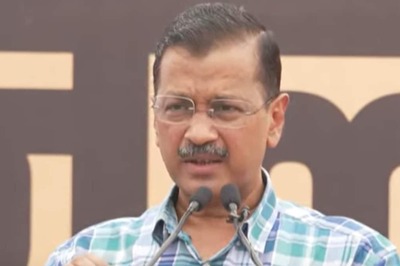
views
New Delhi: Ever since Judge OP Saini concluded the hearing in April this year, verdict in the 2G spectrum allocation case has been the most awaited so far. As the special CBI Court acquitted all the accused in the 2G case stating that the prosecution had failed to prove the case “beyond reasonable doubt”, News18 looks at the key arguments put forth by the defence lawyers during trial.
The “2G Scam” had rocked the UPA government over alleged irregularities in the allocation of second generation (2G) spectrum in 2008, when Unified Access Services (UAS) licences were issued on a first come, first served (FCFS) basis at a price that was decided in 2001.
In its 80,000 page charge sheet that filled four large trunks and was filed in April 2011, the CBI had alleged that the government exchequer had suffered a loss of Rs 30,984 crore in the allocation of 122 licences for 2G spectrum.
The main accused in the 2G case was A Raja of the DMK, who was the Minister for Communications and IT in the UPA government.
The case centres around five main allegations, fixation of an arbitrary cut-off date, violation of FCFS policy in issuing Letters of Intent (LoIs), granting of UAS licences to two ineligible companies, cheating the exchequer by non-revision of entry fee and payment of Rs 200 crore bribe to Kalaignar TV Pvt Ltd, promoted by the family of DMK patriarch M Karunanidhi.
Judge Saini on Thursday, while acquitting all the accused said, “CBI has miserably failed to prove charges against all the accused persons. Therefore, the accused are acquitted of all the charges and they are required to submit a security bond of Rs 5 lakh each, which is a requirement of Section 437-a of Criminal Procedure Code.”
A Raja’s Defence
Raja had continuously argued that all the decisions that he had take during the allocation of 2G licenses was in public interest. His main ground was that he brought in new players, increased tele-density and lowered tariffs.
He had also submitted that he did not derive any personal benefit. The other defence argument that Raja had put forward was that the old GSM operators were not happy with the entry of the new players. He submitted that there was a cartel among old GSM operators as their interest was being affected by the new entrants.
He had also submitted that all his decisions were defended by the Manmohan Singh-led UPA government. The advocate appearing for Raja had argued that the government and the Prime Minister were happy with the decisions taken by Raja. He had also dismissed that he was aware of any monetary transaction between DMK-owned Kalaignar TV and the DP group and had argued that CBI had assumed that since he was the DMK leader, he has to be aware of such transactions.
Kanimozhi’s Defence
Kanimozhi was accused of gaining an investment of Rs 200 crores in the DMK run Kalaignar TV and her counsel argued that her tenure as the director of the channel did not correlate with the allegations levelled against her. She had submitted that she was the director of the channel for just two weeks. She further claimed that she had become aware of certain funding received from Cineyug Films Pvt Ltd, but she was not aware of the details and was no more associated with the organization after June 20, 2007.
Former Telecom Secretary, Siddharth Behura’s Defence
Siddhartha Behura, who as the telecom secretary signed the controversial 2G licences announced on January 8, 2008, was incidentally a key officer responsible for the liberalization of the industrial sector in India way back in 1991.
When Prime Minister Manmohan Singh, the then finance minister, pioneered the liberalization process in 1991, it was Behura who as a joint secretary in the department of industrial development successfully formulated India’s New Industrial Policy, 1991. He had worked with A Raja when he was the Minister for Environment and Forests.
Behrua has throughout maintained in court that he did not derive any financial benefits from Raja. During questioning Behrua had claimed in 2008 that former Solicitor General, GE Vahanvati issued a false statement to disassociate himself from the ‘First Come First Serve’ policy on the basis of which the 2G spectrum was allocated.
Behura had also claimed that the former Solicitor General made a false statement on the draft press release on Letters of Intent (LoI) issued to eligible telecom companies.
Swan Telecom, Reliance Officials’ Defence
Anil Ambani, who was questioned in the 2G case, had denied that he was responsible for any misdealing. The CBI had claimed that Reliance Telecom Ltd (RTL) invested over Rs 990 crore in Swan Telecom, and Tigers Traders, Zebra Consultants and Parrot Consultants created a façade to hide Swan’s real owners. However, Ambani had claimed that even though he had seen the documents, he was not aware of any such companies or their existence.
Swan promoter Shahid Usman Balwa, during questioning had alleged that the Tatas and Videocon Group’s Venugopal Dhoot’s brother and RS MP Rajkumar Dhoot “…misused his Parliamentary position to reserve a place for Datacom executives in the queue to submit the LoI compliance”.
The advocate appearing for Balwa had argued that the Tatas also gave Rs 20 crores as charity to a medical college-cum-hospital run by A Raja’s trust in his constituency. The counsel argued that regarding allegation of the investment of Rs 200 crore bribe, the gap of 1.5 years between January 2008 and August 2009 was a thing that was a “first time in the history.”
Unitech MD, Sanjay Chandra’s Defence
The company argued that older GSM operators were not happy with the entry of new players and hence the scam was drawn up. The counsel of Chandra argued as to why the CBI spared other telecom companies like Tata, Spice or Loop. He also questioned as to why did these big companies prepare their demand drafts in advance which was prepared a day before the Letter of Intent was distributed.




















Comments
0 comment